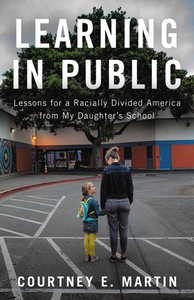Take a photo of a barcode or cover
65 reviews for:
Learning in Public: Lessons for a Racially Divided America from My Daughter's School
Courtney E. Martin
65 reviews for:
Learning in Public: Lessons for a Racially Divided America from My Daughter's School
Courtney E. Martin
challenging
informative
medium-paced
I had higher hopes for this book. It was very boring and repetitive. Self-serving and had unnecessary passages. Definitely longer then it needed to be.
challenging
emotional
hopeful
informative
inspiring
reflective
slow-paced
challenging
informative
medium-paced
informative
inspiring
reflective
medium-paced
Yes, this is very much a story told from a privileged, liberal, white woman’s perspective. I found a lot in this book that echoes my own thoughts, feelings, blind spots, aspirations. It is also annoying to be confronted with what is often an unflattering portrait of someone who could be me!
Some of the parallels with my own experience (both significant and insignificant) were uncanny, which made the book a bit more fun. Ultimately, I found this book to be thought-provoking. It raised a challenge for me personally to go beyond my liberal, rich, white lady thinking and further reinforced my convictions about the importance of public school for my children, our community, and this society.
Some of the parallels with my own experience (both significant and insignificant) were uncanny, which made the book a bit more fun. Ultimately, I found this book to be thought-provoking. It raised a challenge for me personally to go beyond my liberal, rich, white lady thinking and further reinforced my convictions about the importance of public school for my children, our community, and this society.
I relate so much to Martin, as another White progressive mom in Oakland committed to the Integrated Schools approach. I’m excited to talk about this book with friends and shift how we talk about schools specifically, and things we don’t know about (like the experiences of our Black neighbors) more generally. I would love to see an updated version five years from now that reflects on how Emerson changes over time and how Courtney navigates the space over time—it felt a little premature to write the book after only a couple years in. There were times when I cringed but I appreciate Courtney’s willingness to put it all in, blind spots and all.
Great book, about a topic I'm really interested in, and it provided a lot of good insight on if school districts matter, and if sending kids to a "good school" is just racist garbage and promoting segregation (spoiler alert, it is). The author did a really good job of mixing the journalism side of it, and the memoir side, making it both full of interesting stories and research, but also having a narrative to follow. That being said, the narrator felt a little sanctimonious sometimes.
I don't think I can finish this one. Not bc it was boring (well, it kinda was toward the latter half) but more bc it was so dang long, for not being a very long audiobook it just felt long. Conversations were added that didn't need to be. The chapter names/poems/quotes started irritating me. I think this white mom had a lot of great intentions, but I also think this book needed a co-author by a black mom and dad. She kept saying how she didn't want to be a white savior, and yet it honestly felt like that's exactly what she (and most def her husband) were. Yes, she was also becoming friends with Black families (to which, golf clap... I guess... I can't tell if it was for this book, for her wokeness, or just for herself). And she was trying to be honest as she kept putting down other white people for being white folk (maybe even more so with her VO tone), but overall something felt off. I don't even know if I learned anything, which is what I was hoping for. I have an hour left of the book and I don't know if I want to listen to more COVID > let's give all our laptops to the Black kid story arch.


